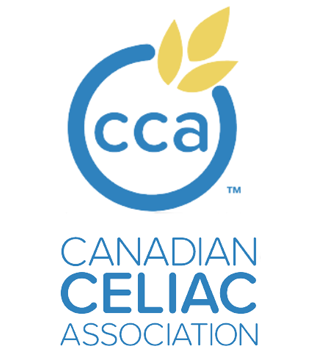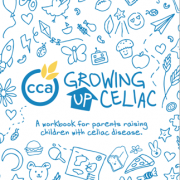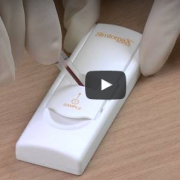Canadian Celiac Association Position Statement on the Gluten Challenge
 The Canadian Celiac Association issues a guide for primary care providers about ordering a gluten challenge.
The Canadian Celiac Association issues a guide for primary care providers about ordering a gluten challenge.
- Canadian Celiac Association 1
Serologic testing for celiac disease (CD) is recommended as an initial step when CD is suspected. However, if a gluten-free diet has been started, the celiac serology is unreliable and can be falsely negative. In this situation your patient may require a gluten challenge.
Prior to starting a gluten challenge:
A celiac screen should be measured prior to initiating a gluten challenge.
- If the TTG is negative, because your patient has been on a gluten free diet, HLA typing may be helpful to rule out the need for further testing.
- Ninety-nine percent of patients with CD are positive for either HLA DQ2 and/or HLA DQ8, or parts of these genes. Thus, if the HLA DQ2 or DQ8 are negative, CD can be ruled out.
- If the HLA DQ2 and/or DQ8 are positive, the patient has the risk for celiac disease. It is very important to note that approximately 40% of adults in North America are positive for either HLA DQ2 and/or DQ8 genes; however, only about 4% of individuals with the genes will develop celiac disease. Thus, genetics only demonstrate risk for CD, while the celiac serology (TTG and/or EMA) detects disease. It is estimated that approximately 1% of the general population has celiac disease.
- If the HLA DQ2 and/or DQ8 are positive, the patient can start a gluten challenge under medical supervision. There are few studies to help inform physicians how best to perform a gluten challenge. These studies enrolled small numbers of study participants. The Leffler et al. study referenced below was performed in 20 adult patients who had a biopsy confirmed diagnosis of celiac disease. More research is needed to best advise patients not yet diagnosed with celiac disease how to undergo a gluten challenge. With these limitations in mind, below are general guidelines for a gluten challenge.
Classical Gluten Challenge
- The adult patient eats high amounts of gluten (typically 8-10 gm of gluten a day, equivalent to approximately 4-6 slices of bread a day) for 6-8 weeks.
- This dose of gluten can be gradually built up over the first week. A repeat celiac screen is done after the challenge.
- This type of challenge can be poorly tolerated by patients, and thus some may be resistant to this approach.
Modified Gluten Challenge
- A newer approach, tested in adults with biopsy-proven celiac disease, reduces the quantity of gluten during the challenge to 3 gm a day (about 1.5 slices of bread a day).
- This reduced dose of gluten is better tolerated by patients and has been shown to be adequate for diagnosis.
Symptomatic Patient
- Consider repeat TTG 2-4 weeks after starting the gluten challenge.
- If the TTG is positive, there is a strong possibility the patient has celiac disease and should be referred for an evaluation by a gastroenterologist. The patient should continue to eat gluten while awaiting appointment with the gastroenterologist.
- If the TTG is negative, then the gluten challenge should be continued, and a celiac screen can be repeated 8 weeks later (12 weeks from the start of the challenge).
- If the TTG is negative, then celiac disease is unlikely. However, it is possible to have TTG negative celiac disease and at this point the patient should be evaluated by a gastroenterologist to determine the value of performing a biopsy. If the patient continues to eat gluten, it would be worthwhile to repeat the TTG in 6 months to a year.
Asymptomatic Patient
- Continue eating gluten for up to 8 weeks, prior to repeating the TTG.
- If the TTG is positive, there is a strong possibility the patient has celiac disease and should be referred for an evaluation by a gastroenterologist . The patient should continue to eat gluten while awaiting appointment with the gastroenterologist.
- If the TTG is negative, then the gluten challenge should be continued, and a celiac screen can be repeated 8 weeks later. If the TTG is negative, then celiac disease is unlikely. Once again, it is possible to have TTG negative celiac disease and at this point the patient should be evaluated by a gastroenterologist to determine the value of performing a biopsy. If the patient continues to eat gluten, it would be worthwhile to repeat the TTG in 6 months to a year.
Pediatric Considerations
A gluten challenge is discouraged in children at certain times of development:
- before 5 years of age,
- prior to the formation of permanent dentition and
- during the pubertal growth spurt.
There are limited studies on the dose of gluten and duration of the challenge in children; however, the modified gluten challenge (above) may be as effective in children as in adults.
If the child remains asymptomatic on gluten, then the child should continue the challenge and repeat serology after 8 weeks. If the child is asymptomatic and the TTG is negative, they should continue eating gluten.
_______
Contributors: CCA Professional Advisory Council
Lead author: Dr. Dominica Gidrewicz, FRCPC, gastroenterologist
References: Leffler D et al. Kinetics of the histological, serological and symptomatic responses to gluten challenge in adults with celiac disease. Gut 2013; 62: 996-1004. https://www.ncbi.nlm.nih.gov/pubmed/22619366
Click here for printer-friendly version
1 https://www.celiac.ca/healthcare-professionals/diagnosis/gluten-challenge/
_______
 The Canadian Celiac Association is the national voice for people who are adversely affected by gluten, and is dedicated to improving diagnosis and quality of life.
The Canadian Celiac Association is the national voice for people who are adversely affected by gluten, and is dedicated to improving diagnosis and quality of life.
- Celiac.ca
- CCA Facebook Page
- CCA Facebook Group – Ask to Join
- Find Local Support
- Join Today
- [email protected]
- Phone: 905.507.6208 • Toll Free: 1.800.363.7296
- Donate to the CCA Today













